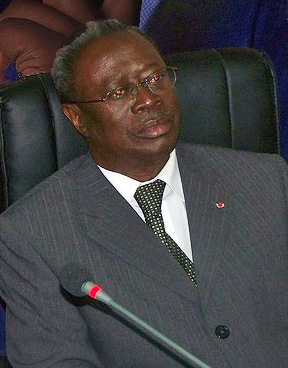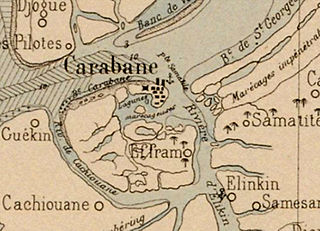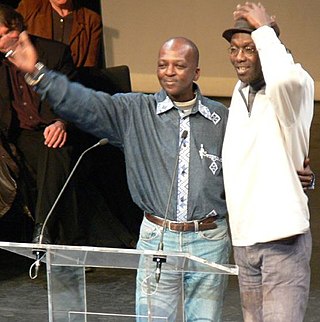Related Research Articles

Senegal, officially the Republic of Senegal, is the westernmost country in West Africa, situated on the Atlantic Ocean coastline. Senegal is bordered by Mauritania to the north, Mali to the east, Guinea to the southeast and Guinea-Bissau to the southwest. Senegal nearly surrounds The Gambia, a country occupying a narrow sliver of land along the banks of the Gambia River, which separates Senegal's southern region of Casamance from the rest of the country. Senegal also shares a maritime border with Cape Verde. Senegal's economic and political capital is Dakar.

Senegal's first President, Léopold Senghor, advocated close relations with France and negotiation and compromise as the best means of resolving international differences after Senegal's independence from its status as a French colony. To a large extent, the two succeeding presidents, Abdou Diouf and Abdoulaye Wade, have carried on Senghor's policies and philosophies. Senegal has long supported functional integration among French-speaking West African states through the West African Economic and Monetary Union.

Casamance is the area of Senegal south of the Gambia, including the Casamance River. It consists of the Lower Casamance and the Upper Casamance. The largest city of Casamance is Ziguinchor.

Prince Sadruddin Aga Khan was a French-born statesman and activist who served as United Nations High Commissioner for Refugees from 1966 to 1977, during which he reoriented the agency's focus beyond Europe and prepared it for an explosion of complex refugee issues. He was also a proponent of greater collaboration between non-governmental organizations (NGOs) and UN agencies. The Prince's interest in ecological issues led him to establish the Bellerive Foundation in the late 1970s, and he was a knowledgeable and respected collector of Islamic art.

The Casamance conflict is an ongoing low-level conflict that has been waged between the Government of Senegal and the Movement of Democratic Forces of Casamance (MFDC) since 1982. On May 1, 2014, the leader of the MFDC sued for peace and declared a unilateral ceasefire.

MV Le Joola was a Senegalese government-owned roll-on/roll-off ferry that capsized off the coast of The Gambia on 26 September 2002, with 1,863 deaths and 64 survivors. It is thought to be the second-worst non-military disaster in maritime history.

Casa Sports de Ziguinchor is a Senegalese professional football club based in Ziguinchor. They play in the top division in Senegalese football. Their home stadium is Stade Aline Sitoe Diatta. It is the most popular sports club in Casamance, the first four letters of the area gives the name to the club, the short form Casa.
Father Augustin Diamacoune Senghor was a Catholic priest and a leading figure in the Casamance independence movement from Senegal. He served as director of the Saint-Louis of Ziguinchor Seminary from 1972 until 1975.

Robert Sagna is a Senegalese politician who served in the government of Senegal from 1978 to 2000 and was Mayor of Ziguinchor from 1984 to 2009. He was elected to the National Assembly of Senegal in 2007.
Aline Sitoe Diatta was a Senegalese heroine of the opposition to the French colonial empire, and a strong young female symbol of resistance and liberty. A Jola leader of a local religious group living in the village of Kabrousse, Basse Casamance, Diatta was one of the leaders of a tax resistance movement during World War II.

Mpack is a village in Niaguis Arrondissement, Ziguinchor Department, Ziguinchor Region in southern Senegal. Government statistics classified it as a rural community and recorded its population as 518 people in 72 households. It is located about seven kilometres from the regional capital of Ziguinchor. It is one of the endpoints of the 90-km long Oussouye-Kabrousse-Cap Skirring-Ziguinchor-Mpack road, which is being rebuilt with 17 billion CFA francs of funding from the European Union. The village used to be on the front lines of the Casamance Conflict between the Senegalese government and the Movement of Democratic Forces of Casamance.

Carabane, also known as Karabane, is an island and a village located in the extreme south-west of Senegal, in the mouth of the Casamance River. This relatively recent geological formation consists of a shoal and alluvium to which soil is added by accumulation in the branches and roots of the mangrove trees which cover most of the island. Along with the rest of Ziguinchor Region, Carabane has a tropical climate, cycling between a dry season and a wet season. The island was once considered an arid location where no useful plants were likely to grow, but it now supports several types of fruit tree, the most common of which are mangos and oranges. Although the nearby Basse Casamance National Park and Kalissaye Avifaunal Reserve have been closed for years because of the Casamance Conflict, Carabane has continued to attract ornithologists interested in its wide variety of birds. Various species of fish are plentiful around the island, but there are very few mammals.
Basse Casamance National Park, located near Oussouye in Ziguinchor, is one of six national parks in Senegal. It is currently closed.

Touré Kunda is a Senegalese band, noted for their musical versatility and political activism. Their 40-year career encompasses recordings in over six languages and collaborations with well-known musicians such as Carlos Santana and Talking Heads. They have had considerable success in Africa and Europe and are active in social causes such as children's rights and advocates for the homeless.

Ziguinchor is the capital of the Ziguinchor Region, and the chief town of the Casamance area of Senegal, lying at the mouth of the Casamance River. It has a population of over 230,000. It is the seventh- largest city of Senegal, but is nearly separated from the north of the country by the nation of The Gambia.
James Joseph Norris, (1907-1976), was an American advocate for refugees and displaced people whose humanitarian work on their behalf was global in scope and spanned three decades, from his appointment as European Director of War Relief Services,, in 1946, until his death on November 17, 1976. Working in collaboration with the Holy See, (Vatican), and Monsignor Giovanni Battista Montini,, Norris established, in 1951, the International Catholic Migration Commission (ICMC). During his presidency of ICMC from its inception in 1951 until 1974, the agency assisted in the provision of relief, rehabilitation and resettlement assistance to over 200,000 refugees.
International Council for Voluntary Agencies is a Switzerland-based global network of humanitarian organisations working on migration and refugee issues. It won the Nansen Refugee Award in 1963.
Evariste Mfaume is a Congolese human rights activist and humanitarian. He founded Solidarité des Volontaires pour l’Humanité in 2003, and won the Africa regional Nansen Refugee Award in 2019.
The Casamance Creole or Cacheu-Ziguinchor Creole also Portuguis Creole is a Portuguese-based creole language that is considered a dialect of Guinea-Bissau Creole spoken mainly in the Casamance region of Senegal and also in The Gambia.
References
- ↑ ATTRIBUTION DE LA MEDAILLE NANSEN, International Association, Brussels, 21st edition 1969 p149 https://cdn.cocodoc.com/cocodoc-form-pdf/pdf/297458962--INTERNATIONAL-ASSOCIATIONS-1969-3-21e-ANNEE-MARS-ditorial-21st-YEAR-MARCH-ASSOCIATIONS-INTERNATIONALES-sommaire-contents-EDITORIAL-uia-.pdf
- 1 2 3 Chartrand, P., Chartrand, R., Holborn, L. W. (1975). Refugees, a Problem of Our Time: The Work of the United Nations High Commissioner for Refugees, 1951-1972. United States: Scarecrow Press. p1425
- 1 2 Trincaz, Pierre Xavier (1984). Colonisation et Régionalisme Ziguinchor en Casamance (PDF). pp. 101, 132.
- ↑ "Discours prononcé par le Prince Sadruddin Aga Khan, Haut Commissaire des Nations Unies pour les réfugiés et Président du Comité de la Médaille Nansen, à l'occasion de la remise de la Médaille Nansen pour 1968 à M. Bernard Arcens, le 10 octobre 1968". UNHCR (in French). Retrieved 2022-08-11.
- ↑ Report of the United Nations High Commissioner for Refugees, 24th General Assembly, 1969.
- ↑ "AWARD OF THE NANSEN MEDAL TO A MEMBER OF THE RED CROSS" (PDF). ICRC: 595.
{{cite journal}}: Cite journal requires|journal=(help) - ↑ S. Steinberg, J. Paxton (28 December 2016). The Statesman's Year-Book 1969-70. Springer. p. 9. ISBN 9780230270985.
- ↑ AFRICAN LANGUAGE INFLUENCES IN CREOLES LEXICALLY BASED ON PORTUGUESE, ENGLISH AND FRENCH, with Special Reference to Casamance Kriul, Gambian Krio and St. Lucian Patwa, Morgan Dalphinis, 1980, https://eprints.soas.ac.uk/28601/1/10672760.pdf